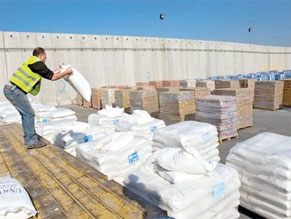|
World Jewish News

Photo by AP.
|
Government approves plan to dramatically ease Gaza blockade
21.06.2010, Israel Three weeks after the violent incidents surrounding the Gaza-bound flotilla, Israel decided on Sunday to dramatically ease its blockade of the Gaza Strip. Under heavy international pressure and concern about additional flotillas that may try to break the naval blockade of the Strip, the security cabinet decided Sunday to change the blockade policy. The decision was delayed a few days due to diplomatic efforts to obtain the support of Egypt and the Palestinian Authority for the changes.
Israeli officials held marathon meetings over the weekend with officials from Egypt and the United States as well as with Quartet representative Tony Blair to finalize the details of the plan to ease the siege on the Gaza Strip.
Daniel Shapiro, senior director for Middle East and North Africa in the National Security Council and chief White House adviser on regional affairs, was in Israel for the past few days for talks with Israeli and Palestinian officials. Special U.S. Middle East envoy George Mitchell went to Egypt to get President Hosni Mubarak on board.
The security cabinet approved the final draft of the new Gaza policy on Sunday during a brief meeting. The proposal was approved unanimously, but the publication of its details was postponed until after a meeting between Prime Minister Benjamin Netanyahu and Blair, who proposed the plan and "sold" it to Netanyahu.
The Prime Minister's Office issued a statement about the security cabinet's decision after the meeting. Blair gave interviews to international media outlets in which he expressed his support for the plan and explained it in great detail.
Netanyahu did not agree to be interviewed or to respond to questions about the new policy, but he did make a short statement before Government Press Office cameras.
In its statement the PMO emphasized that the change would not counter Israel's policy "to defend it citizens against terror, rocket fire or any other hostile activities from Gaza."
The highlight of the new policy is to be the creation and distribution of a detailed "black list" of goods that will not be permitted into the Gaza Strip. Only weapons or "dual-use" materials that could be used to manufacture weapons will be on the list. Any item not on the list will be permitted into Gaza.
At present, Israel allows into Gaza only 114 items appearing on a list that was updated every few months. As a result of the change, thousands of items will be permitted into the Strip.
Large quantities of building materials are to be brought in for projects with PA approval such as schools, clinics and water and sewage infrastructure. Building materials for homes in Khan Yunis and other Gazan towns will also be allowed in. All construction projects are to be under close UN supervision to ensure that Hamas does not use the building material for fortifications and bunkers.
"Israel seeks to keep out of Gaza weapons and material that Hamas uses to prepare and carry out terror and rocket attacks toward Israel and its civilians," Netanyahu said. "All other goods will be allowed into Gaza."
Since Operation Cast Lead, last year, Israel has permitted only limited amounts of building materials to be imported into the Strip, for a small number of projects.
The change in policy is also aimed at improving economic activity in the coastal territory, said the PMO.
Israel also promised to expand border crossing operations in order to significantly increase the inflow of goods into Gaza. Most goods enter Gaza at the Kerem Shalom terminal, which is not operating at full capacity. Activity at the Sufa, Karni and Erez crossings has diminished considerably since Hamas took control of the Strip in 2007.
As part of the new policy, Israel is to open new border crossing points, conditional on security requirements. Moreover, Israel has promised to expedite the traffic of people in and out of the Gaza Strip. In the vast majority of cases, this involves Palestinians who need medical care in Israel, or people who are with foreign aid organizations.
Israel would consider further easing its siege as the situation on the ground improved, said the PMO. It would also continue to inspect every item brought to the Ashdod Port bound for the Gaza Strip. The PMO emphasized in its statement that Israel's defense regime along the Gaza border would remain in place and that Israel still sees Hamas as a terrorist organization.
Israel intends to commit itself to the swift transfer to Gaza of humanitarian aid that is delivered to the port of Ashdod.
"After the change in policy international attention will be on the Qassam rockets fired by Hamas and not on the coriander seeds that Israel does not allow into the Gaza Strip," a senior source in the PMO said Sunday.
"It would have been correct to alter the old policy [on the siege] even if there was no flotilla," a senior official in Netanyahu's office said. "The new policy will prevent absurd situations like preventing the import of pasta into the Gaza Strip and bolster Israel's ability to maintain the security siege vis-a-vis the world, and it will aid the moral position of Israel, which demands the release of Gilad Shalit."
By Barak Ravid
Haaretz.com
|
|
